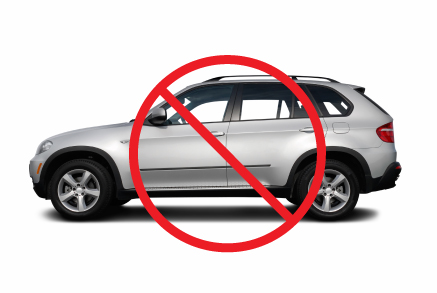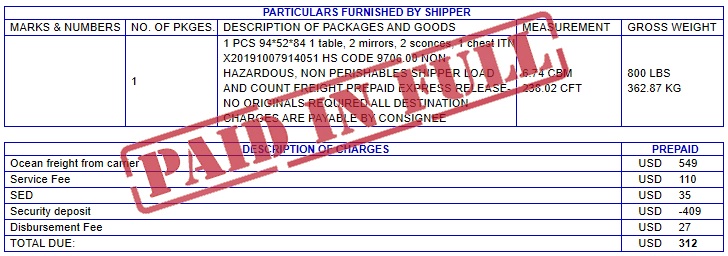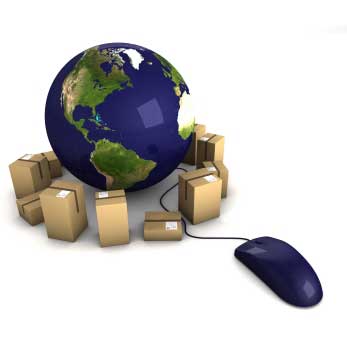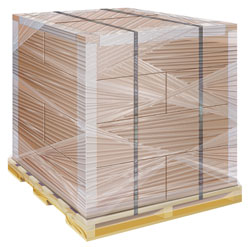|
|
Watch a movie | Restrictions | No Motor Vehicles or Parts with VIN | Reading LCL Rates | By Country
LCL Freight in International Shipping from the USA
LCL sea freight is a cost-effective international shipping solution to send goods in boxes, crates, and pallets.
In the context of global cargo transportation, it refers to "Less than Container Load." It is designed for transporting loads that do not fill an entire 40-foot container.
Unlike with FCL, with this service, shippers are not at risk of heavy penalties from steamship lines, which may occur even for minor negligence at any stage of container transportation.
With international shipping via LCL, shippers share space in 40-foot sea containers handled by non-vessel operating common carriers (NVOCC) - cargo consolidators. It is more flexible and convenient for transporting goods overseas than FCL. That is why experienced exporters often choose it to ship commodities overseas, even though they ship loads sufficient to fill an entire 20-foot container.
Whether you ship commercial commodities, deliver personal belongings from the U.S., or relocate overseas, it doesn't matter. Suppose the goods are appropriately packed in boxes or crates and the overall volume does not exceed 15-20 cubic meters. There are many advantages to using an LCL carriage instead of hauling entire containers.
With LCL, you can deliver overseas a relatively large load, significantly reducing the international shipping cost:
- When you share a 40-foot sea container with other exporters, you do not pay for the entire container but only for the space used in it. This is obviously more cost-effective than conveying a whole container.
- Typically, LCL rates are calculated based on volume (in cubic meters or cubic feet) rather than weight. The capacity of vessels is not limited to the weight of the load but by the hold of the ships. Most of the time, weight with Less-than-Container-Load is not a pricing factor. International shipping costs for LCL shipments depend on the volume of cargo, rather than its weight. You may find more information about dimensional weight in global cargo transportation from the United States by sea and U.S. domestic ground transportation LTL on the website.
- If you ship Less-than-Container-Load, you may save on U.S. domestic ground transportation. If you self-deliver your items, packed in boxes that can easily fit into your own or rented truck, to a carrier terminal, you eliminate pre-carriage expenses. The costs of cargo transportation within the United States are pretty high. Delivering cargo to a carrier terminal may even exceed the cost of cargo transportation abroad.
It is flexible:
- Suppose you self-deliver your cargo, packed in loose boxes, to an ocean carrier terminal (professionally referred to as a CFS - Container Freight Station). In that case, your boxes can be professionally palletized into one or more skids at the CFS. By palletizing your boxes, you ensure they are safe for international shipping. Handling small and light boxes is much easier than carrying heavy pallets. You may palletize smaller boxes and request the CFS to ship oversized items loose.
- With Less-than-Container-Load, you can ship overseas boxes, crates, or pallets of any size and form. The only limitation is that all units must fit into a 40-foot sea container. The internal dimensions of such a container are:
Length - 39'5" = 12 meters
Width - 7'5" = 2.35 meters
Height - 7'10" = 2.39 meters - Sending goods from the USA in cardboard boxes complies with ISPM 15 regulations that apply to global cargo transportation. You can purchase regular boxes at U-Haul, Walmart, Office Depot, etc. For extra protection, we recommend using heavy-duty cardboard moving boxes, which are widely available online. Then, you palletize your boxes on certified ISPM15 stamped or plastic pallets.
Please note that if you self-deliver your cargo, packed in loose cardboard boxes, to a CFS, the CFS can properly palletize and shrink-wrap your boxes for a fee of $35-$50 per pallet, which includes the cost of a certified pallet provided by the CFS. Use the opportunity. Typically, you may not palletize boxes by yourself. Deliver light, easy-to-handle boxes in CFS and let professionals handle the palletizing. Additionally, loose boxes are much easier to handle; you transfer the responsibility for ISPM 15 compliance to the CFS. Then, your boxes should not encounter any problems related to ISPM15 during global transportation from the USA.
Watch this short video on YouTube about international shipping goods from the USA overseas utilizing Less-than-Container-Load services.
Restrictions on LCL freight from the USA
No foodstuffs, wine, or drugs: Any foodstuffs, including wine and pills, perishable food items, edible animal byproducts, supplements, and other similar items are strictly regulated. Violations of these regulations can result in detention, confiscation, or destruction of cargo, fines, and civil or criminal charges.
Other restricted commodities for exporting from the U.S. overseas: To make it easier, avoid sending items prohibited for export from the U.S. overseas that you see at your local USPS post office. Otherwise, it may result in problems at the origin or destination, incur extra expenses, lead to penalties, or even result in legal or criminal charges. At the time of packing your goods for international shipping, you should not include in your shipment the following:
- Perishable food products
- Live animals, plants, and seeds
- Any medicines and drugs
- Dangerous and Hazardous Goods are restricted and subject to approval and special procedures.
- Aerosols
- Liquids
- Cash, Money orders, credit, and debit cards
- Passports and other confidential documents
- Valuable jewelry, art, and antiques
- The entire shipment may be considered dangerous goods if it contains something with a battery (even a dry battery). An example would be a laptop with a built-in battery.
- If you pack items into used boxes, erase all the previous labels. Pay extreme attention to dangerous goods labels.
Commodities under special U.S. export regulations:
- Sensitive goods include firearms, missile technology, fingerprint analysis equipment, chemical and biological controls, encryption items, and other similar items. These goods may require an export license or be subject to restrictions depending on the destination.
- Items could affect national security, nonproliferation, foreign policy, or human rights. The Export Administration Regulations (EAR) and the Commerce Control List (CCL) control these items. The EAR and CCL classify items by their Export Control Classification Number (ECCN) and assign them a reason for control.
- Items under sanctions or embargo by the U.S. government. These items are prohibited from being exported or re-exported to certain countries, entities, or individuals under U.S. economic sanctions or trade embargoes. These countries include Cuba, Iran, North Korea, Syria, Russia, and Belarus.
- To determine whether your product, technology, or service might need an export license or be subject to other legal requirements, consult the U.S. Export Regulations website or contact a Bureau of Industry and Security counselor.
Motor vehicles or parts with a VIN are prohibited with LCL. Shipping auto parts without a VIN is allowed.
Motorized vehicles requiring DMV (U.S. Department of Motor Vehicles) registration, such as automobiles, motorcycles, mopeds, jet skis, ATVs, etc., CANNOT be shipped from the United States using Less-than-Container-Load. This is because U.S. customs does not recognize international shipping companies' warehouses (CFS) as an exam site for motor vehicle inspection.

Exporting auto parts from the U.S. using LCL is generally permitted unless a part requires a VIN (Vehicle Identification Number).
Reading LCL freight rates.
Less-than-Container-Load rates can be all-inclusive (all-in) or subject to additional surcharges. Surcharges on rates can be either a percentage of the rate or a lump sum added to it. These surcharges can take various forms, such as fuel surcharges, Bill of Lading fees, palletizing fees, overlength surcharges, dangerous goods surcharges, etc.

Please do not confuse the total international shipping cost in freight forwarders' invoices with the freight cost from an ocean carrier.
The example above illustrates a breakdown of a sea carrier's costs. Below is an example of a freight forwarder's invoice that includes the price from a carrier and displays a service fee.
The Bill of Lading you received is not an invoice. The charges displayed on the BOL have already been paid to the ocean carrier on the shipper's behalf. The carrier charges and their breakdown on the BOL are provided for reference only.
According to the U.S. Code of Federal Regulations, ...An Ocean freight forwarder is an individual or company that dispatches shipments from the United States via common carriers and books or otherwise arranges space for those shipments on behalf of shippers. Ocean forwarders also prepare and process the documentation and perform related activities pertaining to those shipments... Ocean forwarders work on customer service fees, which must be itemized on quotes and invoices.

Please note that the destination charges are not included in either the ocean carriers' or the freight forwarders' invoices. Destination charges (sometimes called local charges) occur at the destinations. Therefore, they are not considered freight charges.
Avoiding common mistakes with LCL
We have published a separate page, written for inexperienced exporters, which can be accessed via the web link located at the top of each page on our website. Please read it. After reading, you should be much better prepared for your journey, regardless of which international shipping company you choose. Below is just a part of the explanation.
A. Do not confuse a parcel service with global cargo transportation using LCL.
Less-than-Container-Load transportation is designed to ship relatively small cargo abroad. Do not confuse this global cargo transportation service with parcel services, such as USPS, FedEx, DHL, etc. LCL always requires paying a minimum international shipping cost, which is typically equivalent to a load of one cubic meter in volume.
LCL is always subject to destination charges. Such charges apply to all modes of cargo transportation. Regardless of the mode of transportation or international shipping company you use, all imports incur destination charges. Destination charges (sometimes referred to as local charges) are incurred at the destination. Therefore, they are not considered freight charges.
A parcel service may be more cost-effective if you ship a small cargo overseas, less than 0.25-0.3 cubic meters of the total volume.
B. Do not confuse LCL freight with international moving companies
Yes, you can, most of the time, ship household goods or personal belongings from the U.S. overseas using Less-than-Container-Load services. However, do not confuse global cargo transportation via Less-than-Container-Load with international moving companies.
All your items must be properly boxed or crated.
Suppose you are moving from the United States to another country. In that case, you may consider services from international moving companies, where the company assessor should visit you and estimate the cost of moving your household goods from the USA, including packing and delivery to an ocean carrier's possession. Certain international moving companies may offer an "all-in" service, including support in recovering your household goods and delivering them to your door at the destination. Then, always clarify with the international moving company whether all charges related to their service overseas are included in the price. You may consider 123movers.com.
However, the prices of international moving companies are high. You may need to find an alternative. One alternative is to move household goods using the Less-than-Container Load service.
C. Shippers' responsibilities in commodities and documents
When shipping goods from the United States abroad, shippers must understand that they are responsible for accurately describing the cargo, ensuring the legality of the commodity, and submitting sufficient documentation for international shipping.
The ocean carrier Bill of Lading (BOL), which is the "title on exporting goods," generally states *Shipper load and count* and 'Said by the shipper to contain.' That means the ocean carrier and the freight forwarder are NOT responsible for the shipper's information on their commodity exporting from the USA.
An ocean freight forwarder should guide the shipper through the complexity of international shipping procedures. However, the shippers are solely responsible for providing all necessary documents related to the shipment.
D. Storage/demurrage at destinations
Several days before the arrival of your cargo at the destination, your consignee (recipient) should receive a notification from the ocean carrier destination agent in the form of an arrival notice. Typically, it will be emailed to the consignee. That is why providing a valid email address is essential. Also, they may make a phone call to the consignee. Ensure that the consignee's initial contact information in your booking request and transferred to your BOL is correct and valid.
The arrival notice should be in an official format and include an invoice with a detailed breakdown of destination (local) charges.
As soon as you receive an arrival notice, act promptly. Your free storage time at a destination warehouse (CFS) is limited. Depending on CFS, it varies between 7 and 14 days. After that, storage/demurrage will begin accumulating. It will apply to destination charges and may dramatically increase the total destination charges.
The ocean carrier destination agent should guide the consignee through the complexity of import recovery. However, if, for any reason, the consignee experiences difficulties with import recovery at the destination, their first step should be to search for a customs broker licensed in the destination country.

Import Regulations by Country. AMID Statistics Import Regulations
Sometimes, new customers ask, "What country are you serving?".
We serve all the countries listed under destinations in our online freight calculator.
Below is the recent statistic showing the % of the shipping volume we serve. Click on a country name to learn about its import regulations.
Country %
United Kingdom 9.05
Australia 6.43
Germany 5.28
Saudi Arabia 4.61
Singapore 4.25
Italy 3.81
France 3.77
United Arab Emirates 2.14
The Netherlands 1.83
Norway 1.83
Spain 1.79
China 1.71
Thailand 1.67
Switzerland 1.63
Sweden 1.63
India 1.51
Japan 1.43
Malaysia 1.35
Sri Lanka 1.35
Czech Republic 1.31
New Zealand 1.23
Ireland 1.23
Israel 1.15
Belgium 1.11
Pakistan 1.11
Kuwait .99
South Africa .99
Puerto Rico .95
Morocco .91
Taiwan .91
Egypt .87
Philippines .87
Portugal .87
Cambodia .83
South Korea .79
Austria .79
Qatar .79
Turkey .79
Denmark .79
Bulgaria .71
Romania .71
Peru .68
Panama .68
Brazil .64
Indonesia .64
Kenya .64
Jordan .6
Hungary .56
El Salvador .56
Poland .52
Costa Rica .52
Paraguay .52
Bahrain .48
Fiji .48
Serbia .48
St. Lucia .48
Uganda .44
Oman .44
Finland .4
Jamaica .4
Croatia .4
Greece .4
Bangladesh .4
Colombia .4
Lithuania .36
US Virgin Islands .36
Guyana .36
Iceland .32
Lebanon .32
Slovakia .32
Dominican Republic .32
Tanzania .32
Estonia .28
Malta .28
Honduras .28
Botswana .28
Slovenia .28
Vietnam .24
Scotland .24
Barbados W.I. .24
Algeria .24
Mauritius .24
Western Samoa .24
Latvia .24
Venezuela .24
Ghana .24
Martinique .2
Cameroon .2
Cyprus .2
Nigeria .2
Luxemburg .2
Chile .2
Sierra Leone .16
Mozambique .16
Papua New Guinea .16
Guatemala .12
Cayman Islands .12
Guadeloupe .12
Bolivia .12
Ecuador .12
Belize .12
Myanmar .12
Tunisia .12
French Polynesia .12
Trinidad .12
Senegal .08
Tonga .08
Togo .08
Haiti .08
St. Maarten .08
Grenada .08
Ivory Coast .08
Djibouti .08
Georgia (republic) .04
British Virgin Islands .04
Suriname .04
Brunei .04
Guinea .04
Yemen .04
Cook Islands .04
Zambia .04


.png)



